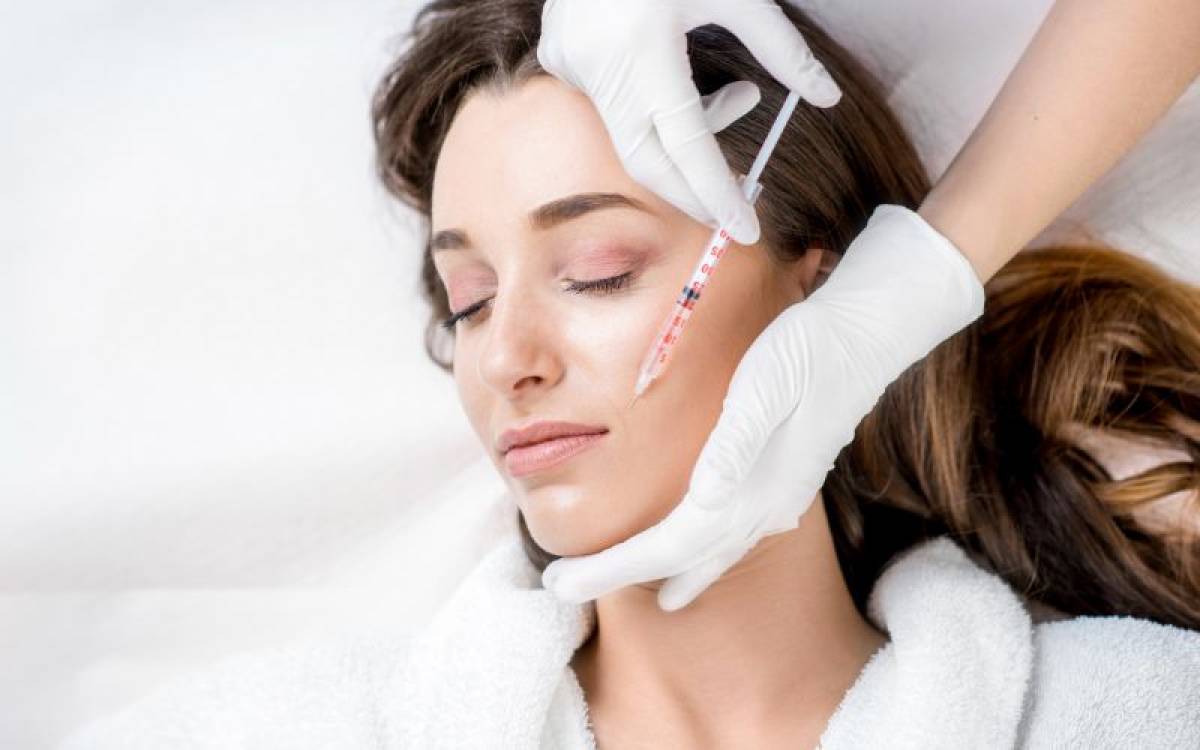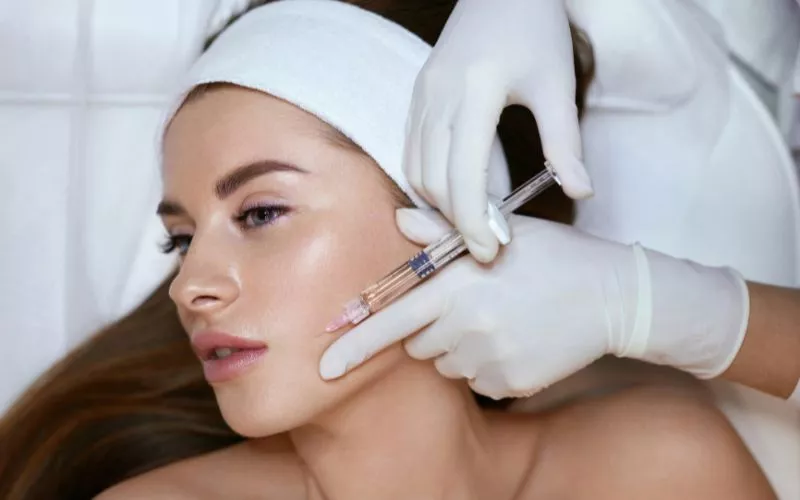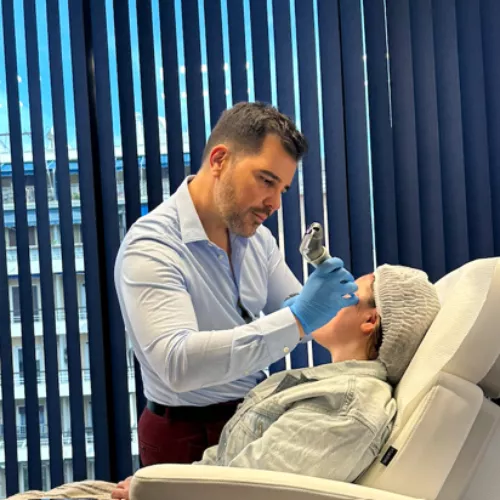
Autologous Exosomes: Advanced Rejuvenation Therapy

Treatment Duration
45
Suggested Sessions
2-3 συνεδρίες τον χρόνο
Modern aesthetic medicine is evolving at breakneck speed, offering new, cutting-edge solutions that activate your body's natural healing powers. One of these innovative treatments is autologous exosomes from adipose tissue, which are completely changing the game in skin regeneration and renewal. It's the new generation in aesthetic and plastic medicine, and it works in a completely natural way.
What are autologous exosomes?
Exosomes are microscopic vesicles that our cells naturally secrete, functioning as "messengers" that carry important information between cells. They're only 30-200 nanometers in diameter and contain proteins, lipids, and genetic material that regulates the function of target cells.
When we talk about autologous exosomes, we mean those that come from the patient themselves. This means they're isolated from your own blood or tissue and then used for your treatment, which ensures absolute compatibility and virtually zero risk of allergic reactions.
The difference from allogeneic exosomes (which come from other organisms) is that autologous ones are recognized by your immune system as "its own," which increases both the effectiveness and safety of the treatment.
When we talk about autologous exosomes, we mean those that come from the patient themselves. This means they're isolated from your own blood or tissue and then used for your treatment, which ensures absolute compatibility and virtually zero risk of allergic reactions.
The difference from allogeneic exosomes (which come from other organisms) is that autologous ones are recognized by your immune system as "its own," which increases both the effectiveness and safety of the treatment.
How do they work in skin therapy?
How do they work in skin therapy?
Autologous exosomes function as powerful activators of natural regeneration processes. When applied to the skin, they work on multiple levels:
- Cellular communication: They transfer important bioactive substances to skin cells, which activates the regeneration mechanism that has become dormant with age.
- Stimulation of collagen production: They contain growth factors that target fibroblasts, encouraging them to produce new collagen and elastin.
- Anti-inflammatory action: Exosomes carry anti-inflammatory molecules that reduce chronic inflammation, one of the main factors in skin aging.
- Protection from oxidative stress: They transfer antioxidant enzymes that protect cells from free radical damage.
Benefits of autologous exosome therapy
Skin rejuvenation
The treatment restores the youthful vitality of the epidermis by activating cellular mechanisms that have become dormant over the years. The result is skin that looks fresh, rested, and full of energy.
Fighting discoloration and age spots
They help regulate melanin production, leading to gradual smoothing of discoloration, spots, and age marks. The epidermis gets a more uniform and radiant tone.
Enhanced firmness
Increased collagen and elastin production offers more firm and toned skin. Areas that have lost their elasticity gradually regain their youthful appearance.
Reduction of fine lines and wrinkles
Exosomes target the deeper causes of aging signs rather than just the external symptoms. This significantly improves fine lines and reduces the depth of wrinkles.
Tightening, hydration, and nourishment
Exosome therapy offers triple benefits for your skin: it helps with tightening by activating collagen, hydrates deeply, and simultaneously nourishes cells with valuable ingredients.
Reduced inflammation in skin problems
For those dealing with rosacea, eczema, or other inflammatory conditions, autologous exosomes reduce inflammation and symptoms.
Faster healing after surgery
After a surgical lifting, exosomes can significantly reduce healing time, minimizing the risk of complications and improving the final result.
Improved radiance and texture
The skin gets a natural glow that comes from healthy cellular function. The texture improves, becoming smoother and softer.
Autologous exosome therapy procedure
Blood draw and processing
The procedure starts with a simple blood draw, similar to a blood test. About 60ml of blood is collected, which then goes through specialized processing to isolate the exosomes.
Preparation and application
After processing, the exosomes are applied to the desired areasthrough micro-injections (mesotherapy).
Duration and comfort
The entire procedure takes about 45 minutes. It's relatively painless, with most patients describing only slight discomfort during application.

Who is suitable for the therapy
- People looking for natural anti-aging solutions
- Those with sensitive skin that doesn't respond well to invasive therapies
- Patients with inflammatory skin problems
- People who want to prevent aging at a younger age
- Those recovering from surgical procedures
Where caution is required
While the therapy is generally safe, there are certain conditions that require caution, such as autoimmune diseases, localized inflammations, or taking certain medications. That's why it's important to inform about your medical history.

Ask the doctor
21 0692 9999
Frequently asked questions
How safe are autologous exosomes?
Autologous exosomes are highly safe since they come from your own body and have minimal risk of reactions or side effects.
When do the first results show?
The first signs of improvement may appear from the first week, with gradual enhancement for 3-6 months. New collagen production continues for months after treatment.
How many sessions are needed?
Usually 2-3 sessions are recommended with 4-6 week intervals for optimal results, depending on your skin condition and goals.
Is there downtime?
Downtime is minimal, you might just notice slight redness or swelling that subsides in 24-48 hours. Most people return to their daily activities immediately.
Can they be combined with other treatments?
Autologous exosomes combine excellently with microneedling, mesotherapy, and other rejuvenation therapies for even better results. A specialized doctor evaluates your needs and suggests the treatment plan.
How long do the results last?
Results can last 6-12 months or longer, since the therapy activates long-term changes in cellular function. With maintenance sessions you can extend the benefits.
What is the price for autologous exosomes therapy?
The price for autologous exosomes therapy is 350€.
Conclusion
Autologous exosomes bring revolution to skin renewal. They harness your body's natural forces to activate collagen, reduce wrinkles, and restore radiance to your skin. If you're looking for a natural and effective solution for a youthful appearance, book your appointment at Facemed Clinic.